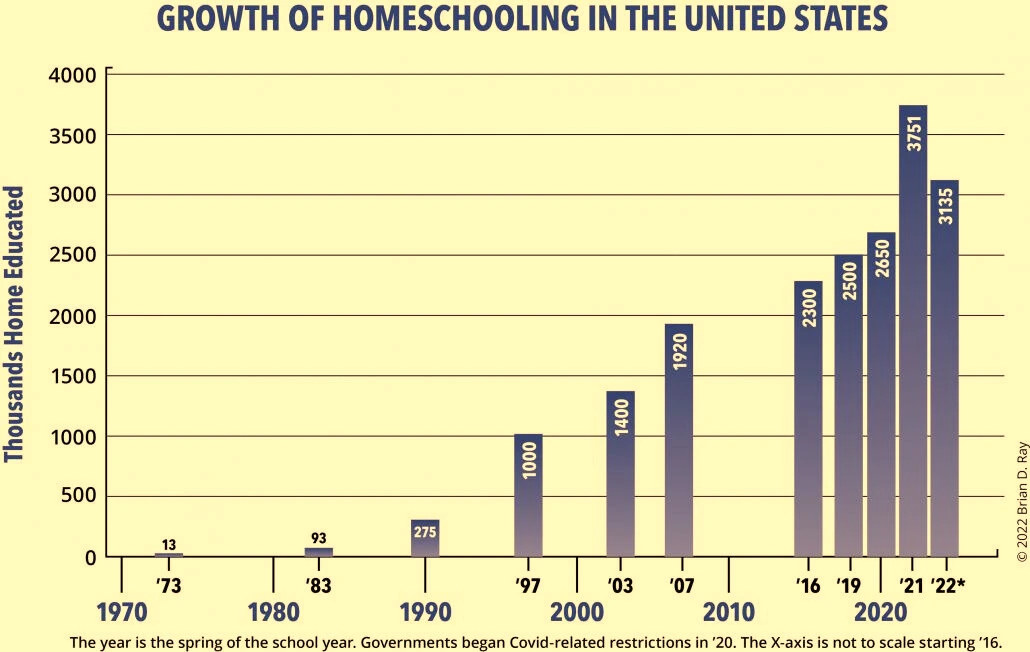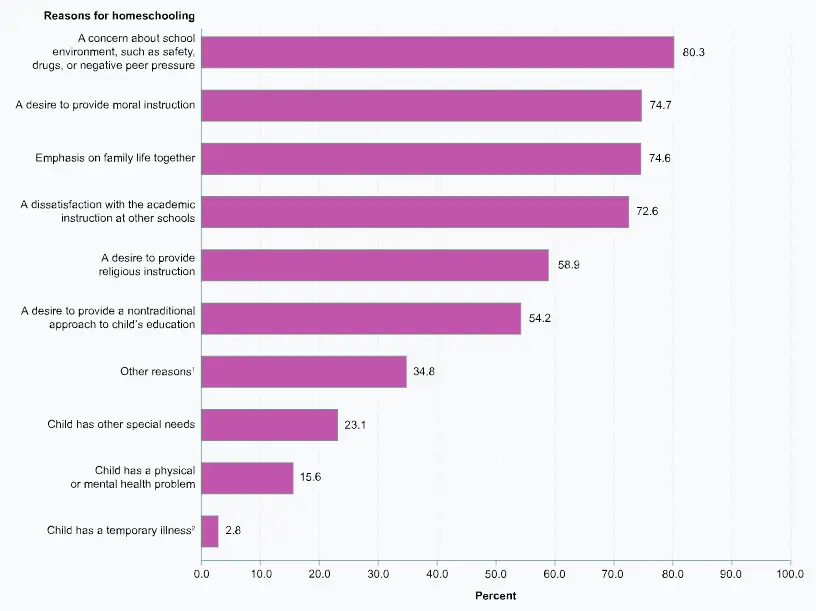Update: This article was last updated on 9th February 2024 to reflect the accuracy and up-to-date information on the page.
Let’s start with the numbers. According to the National Home Education Research Institute (NHERI), 3.7 million children were homeschooled in the United States during the 2020-2021 academic year.
History
Since we are talking about homeschooling, it is crucial to understand how and when it first emerged. Educational theorist and supporter of school reform John Holt inspired this modern homeschooling. He recommended parents take their children out of a repressive school environment where rote learning was the norm. Holt’s voice became stronger when educational expert and friend Raymond Moore joined the effort. Moore’s 1981 book Homegrown Kids quickly became well-known and was typically the first book many homeschoolers read. Homeschooling has continued to expand rapidly throughout the years, with the movement becoming more powerful in the 1980s.
What is Homeschooling in the USA?
Children are called homeschooled in the United States if their parents report that they are receiving their education at home rather than in a public or private school if their enrollment in public or private schools does not exceed 24 hours per week, and if they are not being homeschooled solely because of a temporary illness.
Digitization and Homeschooling
The landscape of education is rapidly changing, and one of the most significant shifts is the increasing popularity of homeschooling. For many families, homeschooling offers the flexibility and customization they desire in their children’s education. In this digital age, homeschooling has embraced online learning tools, opening up a world of educational resources, interactive lessons, and personalized learning experiences. In this blog, we will explore a variety of online learning tools that can empower homeschooling families to provide high-quality education from the comfort of their homes.
Recommended Reading: WHY DO KIDS HATE SCHOOL? HOW TO MAKE THEM LOVE IT
Best Tools For Overall Homeschooling Learning
1. Curriculum Planning and Management Tools
Effective homeschooling often begins with careful planning. There are online tools designed to help parents organize curricula, set learning goals, and track progress. Some platforms even offer pre-designed lesson plans, easing the burden of curriculum development.
Homeschool Manager: An online tool for comprehensive record-keeping, including time & attendance, volunteer hours, report cards, and more. It offers flexibility to include non-home-taught subjects on transcripts and streamlines lesson planning, field trip tracking, and book lists, saving valuable time.
Features
- At-a-Glance Overview: The Parent Dashboard provides a glance at students’ daily progress and assignments, highlighting overdue and grading-required tasks. Students can access their assignments through the Student Tiles Dashboard.
- Grading Made Simple: Easily calculate and monitor grades, keeping tabs on course averages.
- Self-paced: Older students can input their tasks and grades, fostering organization and responsibility skills.
- Printable Records: Generate professional reports and homeschool transcripts as PDFs, including weekly schedules for offline use.
- User-Friendly: Enjoy a seamless drag-and-drop interface for scheduling lessons, multi-student task assignments, and adding assignment links. Perfect for tech-savvy homeschoolers.
2. Interactive Learning Platforms
Interactive online learning platforms bring subjects to life. These platforms offer engaging lessons that incorporate multimedia elements, making learning fun and memorable.
1. KITABOO: It’s a cloud-based, interactive platform for flexible, anywhere, anytime learning. Create multimedia courses with ease, including audio, video, images, and text. Add interactivity with MCQs and quizzes. Track performance and engagement using analytics. Device-responsive for Android and iOS. Trusted by 10 million users across 25 countries.
2. SAP Litmos: An adaptable online platform for remote learning on any device, including mobile. Equipped with powerful tools for course creation, storage, and delivery, including in-depth completion and assessment tracking. Supports multimedia integration of various training and assessment formats and offers customization options for course personalization.
Recommended Reading: ROBINDELL PRIVATE SCHOOL: ALL YOU NEED TO KNOW!
3. Blackboard Learn : A modern, intuitive, and fully responsive LMS designed to provide an exceptional learning experience. It offers simplicity and ease of use while being powerful enough to support teaching and learning anywhere and anytime.
4. The Class of One: An innovative online school revolutionizing traditional learning. Offers top-notch Oxford Advantage curriculum with engaging digital content, plus a range of co-curricular activities and fitness classes. Ensures your child’s success while saving costs. Join the school of the future.
5. Time4learning: Tailor your child’s grade level for each subject in our homeschooling program. They learn at their own pace, reducing academic pressure. Engaging lessons with videos, animations, and quizzes keep them motivated and track their progress for state requirements. Boost their confidence with Time4Learning.
3. Assessment and Progress Tracking Tools
![]() To ensure that homeschooling is effective, it’s essential to assess student progress. Online quizzes, tests, and assessment platforms provide valuable insights into how well students are grasping concepts and where additional support may be needed.
To ensure that homeschooling is effective, it’s essential to assess student progress. Online quizzes, tests, and assessment platforms provide valuable insights into how well students are grasping concepts and where additional support may be needed.
1. Activity Journal by Homeschool Hall: Monitor your child’s progress and align with your goals using our customizable Stats dashboard. Set and track your objectives, ensuring a balanced homeschool education by assessing the time spent on each subject for every child.
2. Quizlet: Quizlet is a versatile web tool for creating interactive study materials like flashcards, tests, and games. It offers customizable study modes, enabling smooth transitions between various learning activities for an engaging experience.
3. ProProf Quiz Maker: It is a trusted online tool for creating and sharing interactive quizzes. It’s widely used by educators, trainers, institutions, and businesses for scoring quizzes, personality assessments, surveys, polls, and various types of tests and exams.
4. Socrative: Socrative is a versatile formative assessment tool for teachers. It allows the creation of quizzes and interactive activities like “space races,” exit tickets, and more. Teachers can collect and analyze student data in real-time, enabling immediate adjustments to improve learning outcomes.
5. Google Workspace for Education: A robust suite of productivity and collaboration tools that enhance homeschooling, it offers various applications and features to support educators and students in diverse learning environments.
4. Online Communities and Support
Homeschooling can sometimes feel like a solitary journey, but it doesn’t have to be. There are thriving online homeschooling communities, forums, and support groups where parents can connect, share experiences, and seek advice. The wisdom and camaraderie of fellow homeschoolers can be invaluable.
- Homeschooling Facebook Groups: Facebook hosts a multitude of homeschooling groups, each catering to specific regions, philosophies, and educational approaches. These groups offer a space for parents to connect, share resources, and seek guidance from experienced homeschoolers.
- Homeschool Forums and Message Boards: Websites like The Well-Trained Mind Community and Homeschool Spot offer discussion forums where homeschooling families can ask questions, share insights, and engage in discussions on various topics related to home education.
- Homeschooling Subreddits: Reddit has several subreddits dedicated to homeschooling, such as r/homeschool and r/homeschooling. These communities provide a platform for homeschoolers to seek advice, share their achievements, and discuss homeschooling-related topics.
- Online Curriculum Communities: Communities often form around specific homeschooling curricula, such as Sunlight Homeschool Curriculum Users or A Beka Homeschoolers. These groups allow parents using the same curriculum to connect, share experiences, and exchange tips.
- Virtual Support Groups: With the rise of virtual communication, many homeschooling support groups for virtual learning now meet online. Platforms like Zoom or Google Meet enable homeschoolers to connect with others worldwide for discussions, workshops, and networking.
- YouTube Homeschooling Channels: YouTube features numerous channels dedicated to homeschooling. These channels often provide practical tips, curriculum reviews, and glimpses into the homeschooling lifestyle.
Benefits of Online Learning Tools
Online learning tools offer a multitude of advantages for homeschooling families.
- Flexibility: Families can create schedules that suit their lifestyles, allowing for individualized attention and pacing.
- Rich Resources: Online tools provide access to vast libraries of educational materials, including videos, interactive lessons, and quizzes.
- Adaptability: Catering to different learning styles, these tools make it easier to tailor education to each child’s needs.
- Self-Paced Learning: Online tools enable self-paced learning, catering to individual needs, whether students need more time or want to accelerate their studies.
Conclusion
Homeschooling has evolved with the times, embracing online learning tools to enrich the educational experience. These tools empower homeschooling families to provide quality education tailored to their children’s needs and interests. By integrating these resources into their homeschooling journey, parents can create a rich and engaging learning environment that nurtures a love for knowledge and lifelong learning.
Moonpreneur is on a mission to disrupt traditional education and future-proof the next generation with holistic learning solutions. Its Innovator Program is building tomorrow’s workforce by training students in AI/ML, Robotics, Coding, IoT, and Apps, enabling entrepreneurship through experiential learning.






























What are some fun and engaging tools for young kids?
ABC Mouse for early literacy, educational apps like Khan Academy Kids, interactive games like Prodigy, and creative platforms like Lego bricks or drawing apps.
How can I keep older kids motivated with their learning?
A: Try project-based learning with science kits, coding courses like Scratch, interactive quizzes with Kahoot, or virtual field trips through Google Earth.